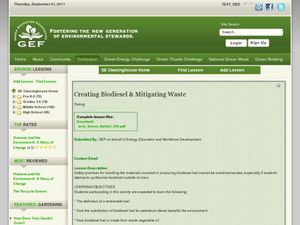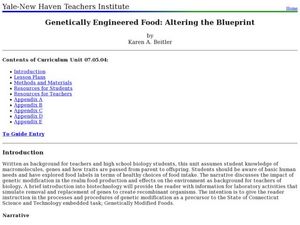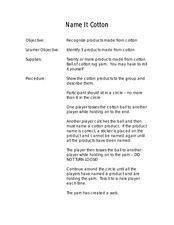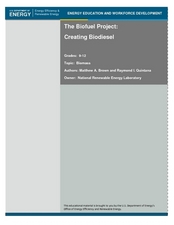Beyond Benign
The Story of Cosmetics Video Assessment
Does your shampoo contain carcinogens? Scholars learn how cosmetic companies create and market their products, many of which contain toxic chemicals. They examine the bias and consumer responsibilities in the industry.
Curated OER
Cosmetic Products Evaluation
Students evaluate different cosmetic products. In this chemistry lesson, students determine the physical and chemical components of their samples. They perform various test such as pH, viscosity, conductivity and formulate a conclusion...
Curated OER
Mad Science Lab: Original Lesson Plan
Students conduct a number of simple experiments, collect and categorize the results as either chemical or physical change. The instructional activity uses connections to folklore, science fiction and comic books to assist each student as...
Curated OER
Creating Biodiesel and Mitigating Waste
Biotechnology pros produce their own biofuel using waste oil and fresh vegetable oil. They test the quality of their product using titration techniques and pH analysis. They write their observations and report their findings. Be aware...
Curated OER
Genetically Engineered Food: Altering the Blueprint
Learners explore the genetic engineering of food. In this health lesson students explain how DNA technology can be used to produce food.
Curated OER
Waste: Where Does It Come From? Where Does It Go?
Students work together to identify sources of hazardous waste in their community. They discover the threat it poses to the environment. They examine how to properly dispose of hazardous waste as well.
Curated OER
Acid/Base Indicators
Students use plant materials as indicators of acids and bases. In this acid/base indicators lesson plan, students use boiled beets, cabbage, flowers, teas or berries that have been boiled with alcohol to test various acids and bases....
Curated OER
Vitamin C Testing
High schoolers determine which of three beverage samples contains the most vitamin C. They then apply their knowledge to an additional situation. Students use beverages that have a large, definite difference of vitamin C content to...
Curated OER
Mined or Grown?
Sixth graders differentiate between raw materials that are cultivated and those that are mined. They collaborate with their eighth grade peers to learn more about the mining complexities at the end of their mineral identification unit.
Curated OER
Hydrated Salt
Students plan, design, and carry out an experiment to determine an empirical formula for a hydrated salt X that tell students when all the water has been removed from hydrate crystals.
Curated OER
Biotech in a Bag
Pupils carry out a series of experiments using self-locking plastic baggies. Each experiment demonstrates a phenomenon or principle of biotechnology.
Curated OER
Products from Petroleum
Students examine products that are petroleum based. In this petroleum product lesson, students examine a display of petroleum based products. They discuss the products that are made from crude oil and conduct an experiment that...
Curated OER
Is It Grown or Mined?
Students are introduced to how to identify various minerals. In groups, they compare and contrast raw materials that were grown and mined. They discuss their views on mining and identify the ore minerals and their purpose to end the...
Curated OER
A DAY WITHOUT AG
Students consider and discuss the meaning of the word "agriculture" and how agriculture affects their lives every day. Students identify the various ways that agriculture touches their personal lives. Students use worksheets to list all...
Curated OER
Name It Cotton
Students identify products that are made from cotton. They participate in an activity in which a cotton ball is thrown to them and in turn they must name a product made from cotton.
Curated OER
How Light Moves
Students study the movement of light. In this light lesson plan, students work in groups to participate in a light and shadow walk around their neighborhood. Students brainstorm rules for light movement and watch videos about light...
Curated OER
Mixing in the Kitchen
Young scholars identify the different types of mixtures. They identify examples of solutions, suspensions, colloidal dispersions, and emulsions through a game and basic experiments.
Curated OER
The Food Pyramid
Learning about nutrition and how to eat healthy foods is very important for kids these days. Here is a lesson plan, designed for 4th graders, that teaches these important skills. Pupils plan nutritional meals by using the USDA's Food...
Curated OER
The Bio-fuel Project: Creating Bio-diesel
Students investigate bio-fuel. In this investigative lesson, students create bio-fuel from vegetable oil waste. Students will analyze, predict, collect and synthesize data from their experiments with bio-fuel.
Curated OER
Economics, Ecology, & Ethics
Students are introduced to the concepts of economics in a ethical way. In groups, they examine a shift in an economy and discover the effects of the shift. After reading an article, they evaluate it and they write their own conclusion...





















